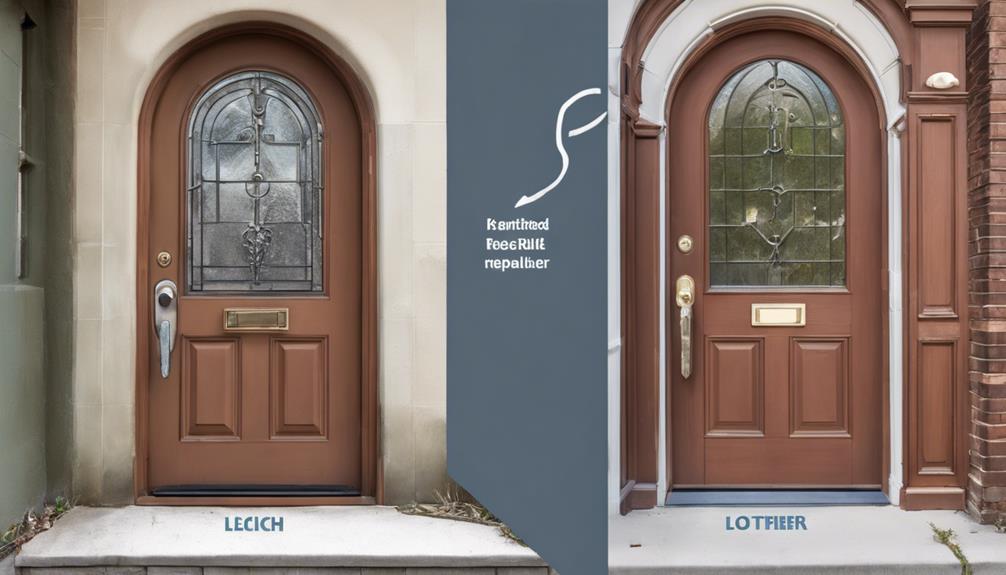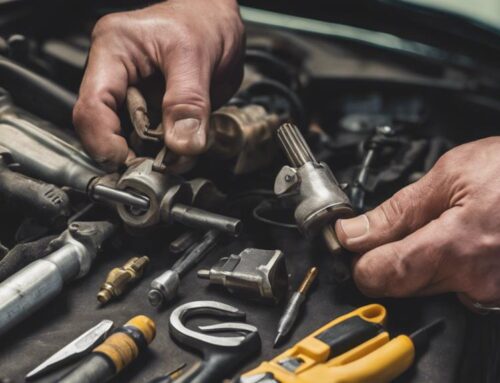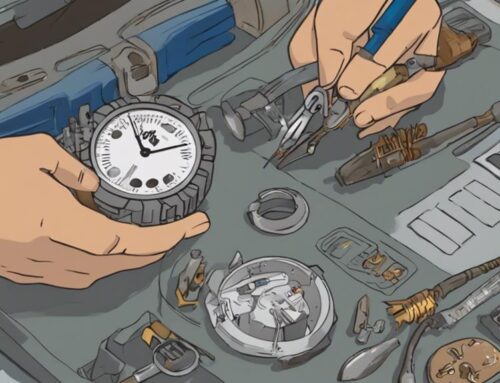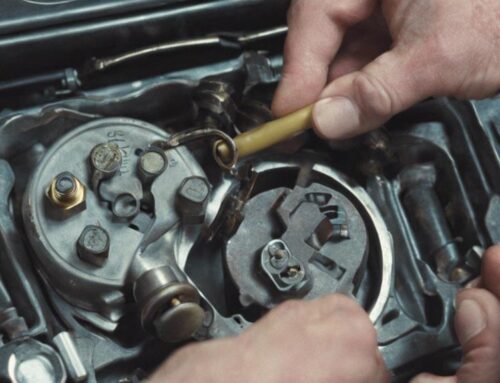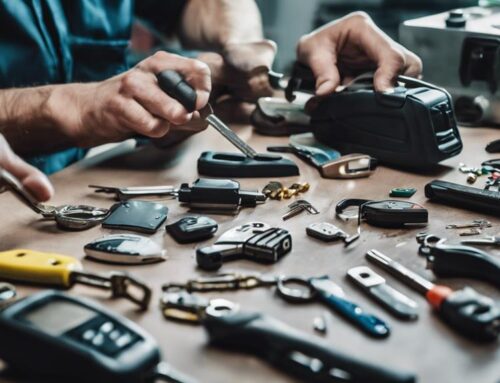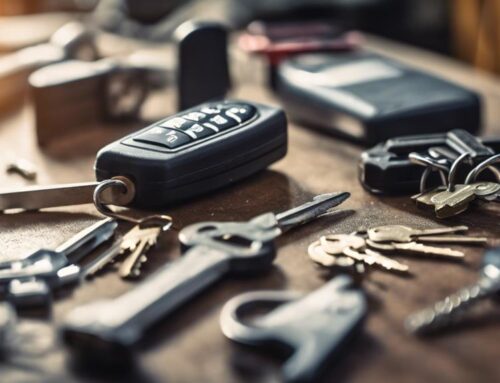When faced with lock issues, it's essential to know the difference between replacement and repair. Lock replacement means installing a new lock for added security and fixing existing problems. Repair is suitable for minor issues like loose knobs or key jams, while replacement is best for severely damaged or compromised locks. Assess the damage severity, considering factors like cost and security concerns. Understanding lock lifespan, wear indicators, and budget considerations can guide your decision. For expert advice on locksmith selection and service quality, verify certifications, experience, and customer feedback are positive. Making informed choices guarantees peak security and cost-effectiveness for your property.
Key Takeaways
- Lock replacement offers enhanced security features and a fresh start, while repair addresses minor issues cost-effectively.
- Signs of damage like key jamming or rust indicate repair, while functional impairment or security concerns warrant replacement.
- Consider the age of the lock; different types have varying lifespans, influencing the decision to repair or replace.
- Extensive wear, security concerns, and budget constraints guide the choice between lock repair and replacement.
- Choose a reputable locksmith for professional guidance on whether repair or replacement is the best option for your lock.
Lock Replacement vs. Repair
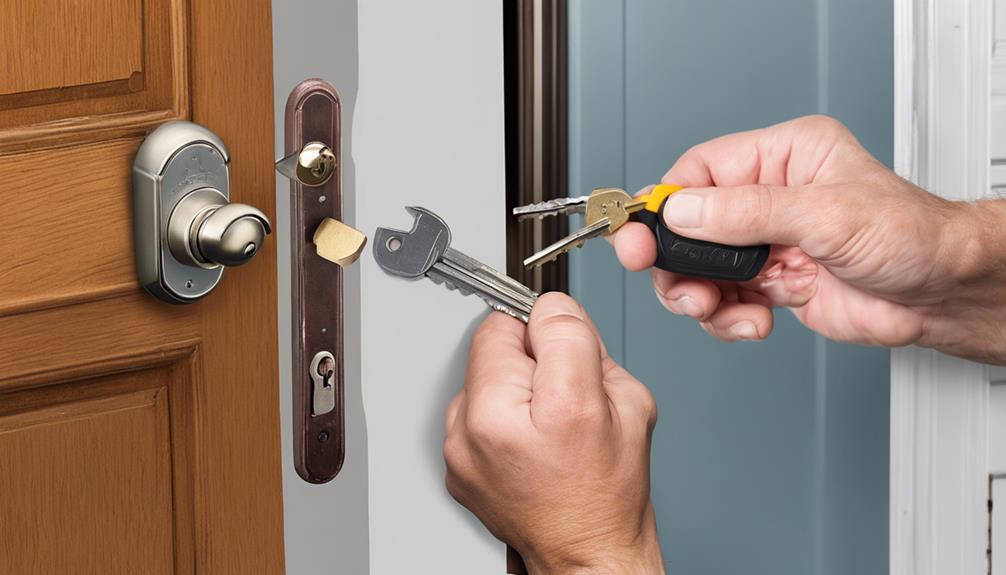
Lock replacement and repair are two common options when dealing with a faulty lock. When considering lock functionality and security upgrades, understanding the differences between replacement and repair is vital. Lock replacement involves installing a completely new lock, providing a fresh start with enhanced security features. On the other hand, lock repair focuses on fixing the existing lock, addressing specific issues to restore its functionality. Whether you opt for replacement or repair, both options can improve your overall security. Replacement offers a thorough upgrade, while repair is a cost-effective solution for minor issues. It is important to assess your needs and budget to determine the best course of action for your lock woes. When making this decision, consider factors like rekeying vs. replacing locks to guarantee you choose the most suitable option for your situation.
Signs of Lock Damage
When evaluating the condition of your lock, it becomes imperative to look out for certain telltale signs that indicate potential damage. Proper maintenance is key to lock security. Here are some signs of lock damage to be aware of:
| Signs of Lock Damage | Description |
|---|---|
| Key Jamming | Difficulty inserting or turning the key. |
| Rust Build-Up | Visible rust on the lock mechanism. |
| Loose Doorknob | Excessive play or wobbling in the lock. |
| Difficulty Locking | Struggle to secure the lock properly. |
| Unusual Noises | Squeaking, grinding, or scraping sounds when using the lock. |
To maintain your lock security, address these issues promptly and consider professional help if needed.
When to Repair a Lock
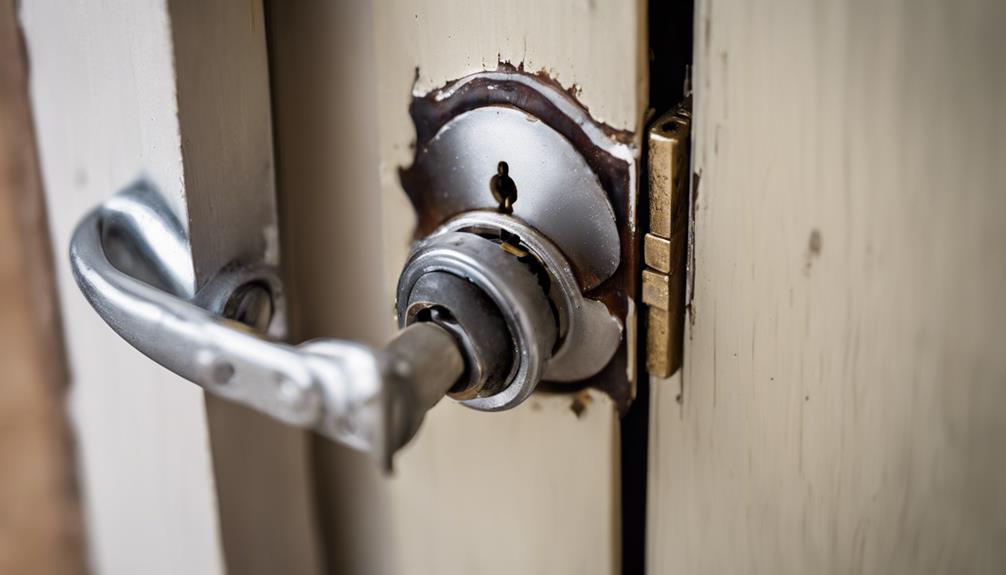
If you notice any of the aforementioned signs of lock damage, it is essential to assess whether a repair is a viable solution. Repairing a lock can often be a cost-effective way to restore its functionality. Here are some situations where opting for a lock repair might be the way to go:
- Loose Doorknob: Tightening screws can often solve this issue.
- Key Jamming: Lubricating the lock mechanism may fix this problem, leading to smoother key operation DIY Lock Repair vs. Hiring a Locksmith .
- Difficulty Turning Key: Adjusting the strike plate can help improve key turning.
- Misaligned Latch: Realigning the latch with the strike plate can improve the lock's performance.
When to Replace a Lock
When considering when to replace a lock, you should take into account the severity of the damage, the age of the lock, and any security concerns you may have. Evaluating the extent of the damage will help determine if a replacement is necessary for ideal functionality. Older locks may be more prone to malfunctioning or being compromised, warranting a replacement for enhanced security measures. It is important to note that understanding the costs involved in lock replacement can also influence your decision-making process, as outlined in a detailed guide to Lock Replacement Costs.
Lock Damage Severity
Lock damage severity plays an essential role in determining whether you should opt for lock replacement or lock repair. When evaluating the severity of the damage, consider the following:
- Minor Damage: If the damage is superficial, such as a scratch or a small dent, repair might be a cost-effective option.
- Functional Impairment: When the lock mechanism is compromised, like difficulty turning the key or the latch not functioning properly, replacement could be necessary. It's important to prioritize functionality to guarantee property security.
- Structural Integrity: Significant damage to the lock structure, such as a broken key stuck inside or a cracked casing, often warrants a replacement.
- Security Concerns: If the damage affects the security of your property, like a lock that can be easily bypassed, replacing it might be the safest choice.
Age of the Lock
The longevity of a lock is a significant factor to evaluate when determining whether a replacement is necessary. Locks, much like fine wine or cheese (but not as delicious), have a lifespan. When deciding whether to replace a lock, consider its age and historical significance. Below is a table to give you a rough idea of how long different types of locks tend to last:
| Type of Lock | Average Lifespan | Historical Significance |
|---|---|---|
| Deadbolt | 10-20 years | Widely used in homes |
| Padlock | 5-10 years | Used since ancient times |
| Mortise Lock | 30-50 years | Common in older buildings |
| Cylinder Lock | 10-15 years | Modern standard |
| Smart Lock | 5-10 years | Latest technology |
Security Concerns
For ensuring the safety and security of your property, it is essential to conduct regular assessments of your locks. When evaluating security concerns, it's vital to be aware of potential risks and vulnerabilities that could compromise the protection of your premises. Here are some key points to take into account:
- Outdated Lock Technology: Older locks may have outdated security features, making them more susceptible to breaches. If your lock is showing signs of wear and tear, such as rust or corrosion, it may be time to think about replacing it soon.
- Physical Damage: Locks that have been damaged due to wear and tear are easier to bypass, posing a security risk.
- Key Control Issues: If key copies have been made without your knowledge, unauthorized individuals may have access to your property.
- Security Breaches: Any history of break-ins or attempted intrusions indicates a need for lock replacement to enhance security measures.
Extent of Wear and Tear
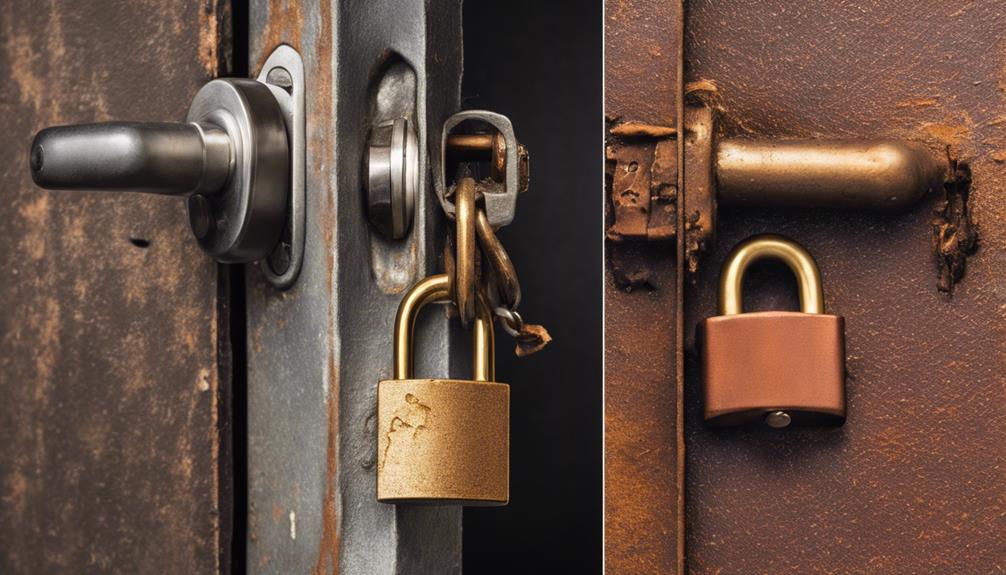
When determining whether to opt for lock replacement or repair, a critical factor to contemplate is the extent of wear and tear present on the lock. Regular lock maintenance is key to prolonging the life of your security system. Look out for wear indicators such as rust, difficulty turning the key, or loose handles. If the damage is minor and the lock is still functioning properly, a repair might suffice. However, if the wear and tear are extensive, with multiple components showing signs of deterioration, a replacement might be the best course of action to guarantee your security. Remember, a well-maintained lock is like a good joke – it keeps things secure and brings a smile to your face!
Low Rate Locksmith Expertise
When considering low rate locksmith expertise, it is essential to compare the skills of different professionals in the field. This comparison can help you determine who offers the most cost-effective solutions without compromising on service quality assurance. Understanding the expertise levels of locksmiths can guarantee that your lock replacement or repair needs are met with the highest standards of workmanship. If you're unsure about the differences between lock replacement and repair, a professional locksmith can provide guidance and help clarify the distinctions.
Locksmith Skills Comparison
With lock replacement versus repair, understanding the locksmith skills comparison, particularly when it comes to low rate locksmith expertise, is crucial. When comparing low rate locksmith skills, consider the following:
- Certifications: Look for locksmiths with proper certifications to guarantee they have the necessary training and knowledge. A reliable locksmith should have certifications such as those recommended in Essential Tips for Choosing a Reliable Locksmith.
- Tools: A skilled locksmith should have a variety of tools at their disposal to handle different lock types and situations effectively.
- Experience: Experience plays a critical role in locksmithing, as it hones skills and allows for quick problem-solving.
- Customer Service: Good communication and customer service skills are crucial, especially for low rate locksmiths who aim to provide quality service at an affordable price.
Choosing a locksmith with a balance of these skills can make a significant difference in the outcome of your lock repair or replacement needs.
Cost-Effective Solutions
For cost-effective solutions in locksmith services, particularly focusing on low rate locksmith expertise, it is essential to contemplate various factors that contribute to efficient and affordable lock repairs and replacements. When seeking budget-friendly options, consider regular maintenance tips to avoid costly emergencies, such as lubricating the lock mechanism, tightening loose screws, and cleaning out debris. Simple steps like these can prolong the life of your lock and prevent the need for premature replacements. Additionally, being proactive about addressing minor issues promptly can save you from more significant expenses down the line. By staying attentive to your locks' condition and employing these maintenance techniques, you can keep your locks in excellent condition without breaking the bank.
Service Quality Assurance
To guarantee high-quality service and expertise in low rate locksmith solutions, it is imperative to engage with reputable professionals who possess a track record of delivering reliable and efficient services. When it comes to service standards and customer satisfaction in the locksmith industry, here are some key points to take into account:
- Credentials: Verify the locksmith has proper certifications and training to handle your needs. Look for professionals who have experience in vintage locks and specialized lockout services for safes.
- Reviews: Check online reviews and testimonials to gauge the quality of their service.
- Response Time: A reliable locksmith should offer quick response times for emergencies.
- Guarantees: Look for professionals who stand behind their work with warranties for customer satisfaction.
Cost Considerations
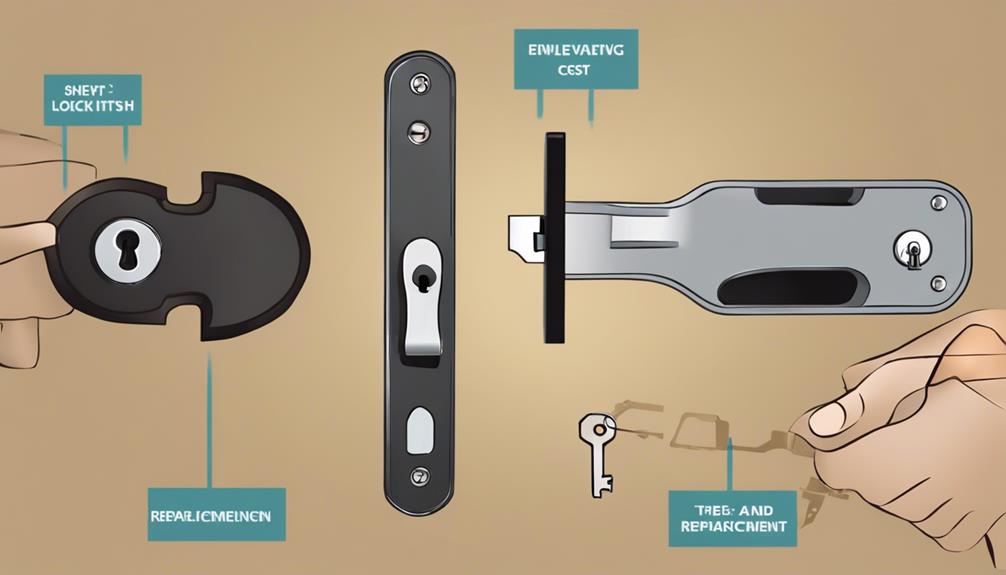
Lock replacement and repair both come with their own set of cost considerations. When deciding between the two, it's crucial to evaluate your budget constraints and the long-term investment each option offers. Lock repair might seem like the cheaper choice initially, but if your lock is old and constantly giving you trouble, you could end up spending more on frequent repairs in the long run. Additionally, rekeying locks can be a cost-effective alternative to full lock replacement, especially if you want to maintain the same hardware but improve security Rekeying vs. Replacing Locks. On the other hand, lock replacement might have a higher upfront cost, but it can provide you with a more secure and durable solution that could save you money over time. So, think about what fits your budget best and reflect on the future benefits of each option before making a decision.
Conclusion and Recommendations
Replacing a lock versus repairing it is a decision that requires careful consideration of various factors, including cost, security needs, and long-term benefits. When it comes to choosing between lock replacement and repair, here are some recommendations to guide you:
- Evaluate the type of lock you currently have and whether it still meets your security requirements.
- Consider the security features of newer lock types available in the market.
- Factor in the cost of ongoing maintenance if you opt for a repair rather than a replacement.
- Think about the long-term benefits of investing in a new, more secure lock system to protect your property effectively.
Making an informed decision based on these considerations will guarantee the safety of your belongings and provide peace of mind.
Conclusion
In summary, when it comes to your security, the difference between lock replacement and repair can make a huge impact. Lock replacement offers a fresh start and enhanced security, while lock repair addresses specific issues to guarantee proper functionality. Don't wait until it's too late – make the right choice for your situation and keep your property secure. Trust the experts at Low Rate Locksmith to guide you through the process and provide peace of mind.

